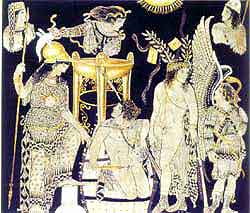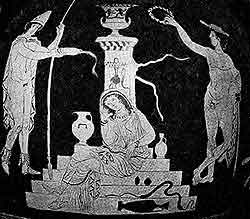Aeschylus
Life: c.525--456 B.C.
He was a member of a noble family of Eleusis, he was the father of famous actor, Euaion and playwright, Euphorion
Aeschylus fought at the battles of Marathon (490B.C.) and Salamis(480 B.C.). He may also have fought at the concluding battle of Plataea (479 B. C.) He visited Sicily twice and died there in the city of Gela.
He composed his epitaph: "Here, in the fertile soil of Gela, lies Aeschylus, son of Euphorion. Of his noble courage the field of Marathon could speak, and the long-haired Mede; for he knows it well."
Aeschylus wrote 90 plays, and won first place 13 times. He acted in and directed his own plays. He was the most admired writer of satyr plays. 7 tragedies and no satyr plays survive. He introduced the second actor, creating dialogue, and when Sophocles introduced the third actor, Aeschylus copied him. The Persians is written for only two actors. He preferred to present his three tragedies at the festival around one story. One of his trilogies, The Oresteia, survives.The Persians was not part of a trilogy.
Surviving Plays:
472 B.C. The Persians. It won first prize and Pericles served as choregos or producer. This the first play known to have been revived in th lifetime of the playwright. It was performed a few years later in Syracuse at the request of the tyrant Heiron.
467 B.C. Seven Against Thebes. It was part of a trilogy on the house of Oedipus.
458 B.C. The Oresteia (Agamemnon, The Choephoroi, The Eumenides). It won first prize and was Aeschylus's last work for the theatre.
Undated works: Suppliant Women and Prometheus Bound. Some scholars question Aeschylus's authorship of the last play.


The Eumenides

Choephoroi